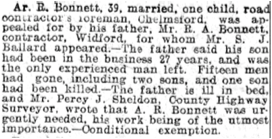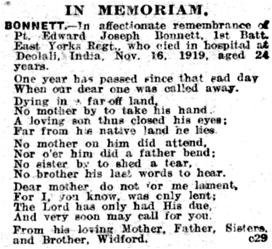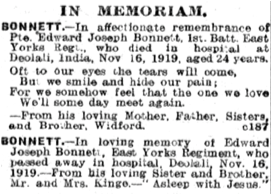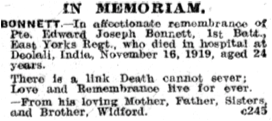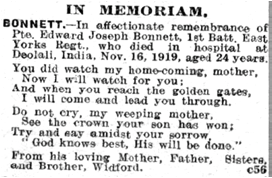Edward Joseph Bonnett was born in Chelmsford, joined the army before the war, landed in France in August 1914, was wounded and discharged on health grounds in 1915. He served a prison sentence, rejoined the army, survived the war, but died in India in November 1919. His family home was in Widford Road. A brother was killed in the war.
Edward was born in Chelmsford in 1896, the son of Robert Arthur Bonnett and Beatrice Bonnett (nee Murkin). His father had been born in 1848; his mother in 1860, both at Hargrave near Bury St. Edmunds in Suffolk. The couple had married c1888, and in 1891 the family had been living in Park Avenue, CHelmsforrd.
Edward’s siblings included Robert Arthur Bonnett (born c1877 in Derby, Derbyshire, died 1932), Emma Elizabeth Bonnett (born c1880 in Peckham, Surrey), Jessie Bonnett (born c1882 in Peckham), Susan Maria Bonnett (born 1884 in Peckham), Florence Bonnett (born c1886 in Peckham), Yorick John Bonnett (born in 1891 in Chelmsford), Elizabeth Annie Bonnett (born in 1893 in Chelmsford) and Catherine Beatrice Bonnett (born in 1899 in Chelmsford).
The 1901 census listed four year-old Edward living with his parents and five siblings in Baddow Road, Great Baddow. At the time his father was a stone pavement contractor, as was his brother Arthur - they won tenders to carry out work for Chelmsford Borough Council to improve streets and pavements on many occasions in the first few decades of the 20th Century.
After Arthur Pryor of Hylands Park died in October 1904 Edward’s father was one of a number of tenants of the Hylands estate who headed the funeral cortege - this indicates that the Bonnett family had moved from Baddow Road to Widford by that date.
A decade later the 1911 census recorded 14 year-old Edward living with his parents, four siblings, two cousins, three boarders and his maternal grandmother at Tudor House in Widford (situated in modern day Widford Road). His father was to remain there until at least 1929. At the time of the census Edward was still at school. His father was described as road and sewage contractor. Eldest brother Yorick was an armature winder (probably at Crompton’s).
Edward joined the army before the start of the war. His short service attestation papers were completed at Warley on 22nd February 1914. He was 18 years and four months old, unmarried and employed as an engine driver. He was described as being five feet nine and a half inches tall, weighed 131 pounds, had an expanded chest of 36 inches, a fresh complexion, grey eyes and brown hair, and was a member of the Church of England. He had a large scar at the back of his right thigh and flat feet.
In April 1914 he was sent to Cambridge Hospital in Aldershot for observation ‘as he wishes to throw himself in the canal. He had bad news from home’. After 21 days observation he was declared fit. In May 1914 he spend a further four days there for vertigo having suffered a fainting fit.
He served with the British Expeditionary Force in France from 13th August 1914. On 5th November 1914 Edward joined the Army Service Corps as Private M/33844 at Aldershot. He served with 52 Company (Motor Transport). He returned to the UK from 26th November 1914 having been wounded.
On 27th November 1914 the Essex Weekly News reported:
“With the 9th Lancers. - Lance-Corporal Edward Joseph Bonnett, son of Mr. R. A. Bonnett of Widford who has been in Oxford Hospital has returned home wounded. He went to the Front as a Private in the Army Service Corps, being a mechanical transport driver, but while on active service was attached to the 9th Lancers, and saw a good deal of fighting with that famous Regiment, incidentally gaining promotion. He went through the battle of Mons, and the succeeding retreat, and then the advance to the Aisne. For a few days previous to receiving his wound he was in operations around Ypres.
Describing to a representative of the Essex Weekly News an existing experience which befell him, Lance-Corporal Bonnett said - ‘ I was on outpost duty, in charge of a party of 24 men. We were lying in wait for the Germans to advance, and presently we found they were sweeping up through the wood. When they got to within about 50 yards of us I fired three shots as a signal to our pickets. The officer in charge of the German party came forward as if to surrender, and his men withdrew, but being suspicious I advanced and bowled him over. One of the officers of the Lancers came up and I reported what had occurred. The result was that the 9th Lancers charged and captured two trenches from the enemy, It may seem a rather cold blooded act to shoot the officer, but we knew the woods were full of Germans, and had the officer marched to our trenches they would have followed and attacked us’.
On the following day the Lance-Corporal had the misfortune to see his particular chum, Pte. O’Brien, killed by his side. The day after that he was himself wounded. While advancing towards the German trenches a shrapnel bullet caught him in the left leg just below the knee. After lying on the ground for half an hour he was picked up by stretcher-bearers, and taken to the field hospital, where the wound was dressed. The next day he entrained for Rouen, and after a week’s stay at the hospital embarked at Le Havre for Southampton, where he arrived on November 11, and proceeded to Oxford.
Lance-Corporal Bonnett mentioned that the 9th Lancers lost very heavily at Compiegne. He characterised the German rifle fire as ‘practically no good’. but stated that their shrapnel shells and machine guns are very deadly. As to the massed formations in which the Germans advance, he said, as soon as the British rifle fire picked off one line, another was ready to take its place. However, he thinks the enemy are becoming pressed for men form the fact that youths are being sent to the firing line. ‘I have seen lads of 16 or 17 walk to their death as bold as brass’ he declared. One thing the enemy cannot stand is British steel. As soon as the English make a bayonet charge the Germans will turn and run as fast as they can go’.
A week later the Essex County Chronicle of 4th December 1914 reported:
“Lance-Corpl. Edward Joseph Bonnett, son of Mr. R. A. Bonnett, of Widford, who has been in Oxford Hospital, has returned home wounded by shrapnel in the left leg just below the knee. He went to the front as a private in the Army Service Corps, being a mechanical transport driver, but while on active service was attached to the 9th Lancers and saw a good deal of fighting with the famous regiment. He went through the Battle of Mons, and the succeeding retreat, and then the advance to the Aisne. For a few days previous to receiving his wound he was in operations around Ypres.”
The December 1915 edition of the Widford Parish Magazine reported:
“Now Widford has its own particular reminder of the horrors of war, in the return of two of our wounded heroes on furlough, Henry Waylett and Edward Bonnett. Our men have been in our prayers, their names have been commended to God at our daily Intercession Services, and this gives us a real interest in them.”
Edward was diagnosed with Tubercle of Lung at a medical at Aldershot on 12th May 1915, by which time he had been promoted to Lance Corporal. The medical report stated that ‘The patient states that he had pleurisy before he entered the service and that he had been in hospital for it since (March and April 1914) and has spend most of his time in hospital since enlistment, He says that he has been coughing for a long time and in September 1914 he began to spit up blood while on active service in Fer-en-Tardenois (France). He was sent to military hospital at Rouen where he was for one month. After 14-days’ leave went to Cambridge Hall Hospital in Aldershot in December 1914 and came out on 27th February 1915. He complains of weakness, loss of appetite, night sweats and rapid loss of weight’. The report concluded that he was suffering from an infection plus constitutional weakness, not caused by active served but aggravated thereby. ‘He has obviously lost flesh. The chest is deformed – pigeon breast and on inspection shows diminished movement on the right side. He had a moist cough’. The report recommended that he be discharged as permanently unfit a suggestion that was endorsed by a medical board meeting the same day.
On 4th July 1915 he was discharged from the army after being declared ‘no longer physically fit for war service’. He had served for one year and 133 days.
However, he subsequently rejoined the army and served with the City of London Rifles and later deserted before getting into trouble with the police.
On 21st January 1916 Edward’s brother, Yorick John Bonnett died in France.
On 28th January 1916 the Essex County Chronicle reported:
“Soldier robs father – At Chelmsford Session on Friday, before Col. G. V. Wood and other justices, Edward Joseph Bonnett, a private in the 3/6th City of London Rifles, late of Widford, charged on remand with stealing four 10s Treasury notes, £1 15s. in money, and a banker’s cheque of his father, Robert Arthur Bonnett, contractor, Widford, between Nov. 11 and Dec. 3, pleased guilty.
At a previous hearing prosecutor said accused was in the Army at the outbreak of the war. He got his discharge from the A.S.C. and was now serving in the City of London Rifles, Witness had noticed that a glass panel of the kitchen door had been broken and some cardboard placed over the breakage, This cardboard had been broken, the bolt slipped, and an entrance effected.
P.s. Smith said he arrested prisoner at a military hospital in Vauxhall Bridge Road, Westminster. Prisoner told him he made the banker’s cheque out for £12 10s. and opened a banking account at the Forest Gate Post-office. He drew 10s. from his account at another office and left the book.
Prisoner now stated that he was sent to France, was attached to the 9th Lancers, and was in the retreat from Mons. He got wounded, was sent home, and discharged as unit for military service, He was jeered because he was not in khaki, so, with a character from the Mayor of Chelmsford and Sir Daniel Gooch, he joined the City of London Rifles. Since then he had suffered from pleurisy and pneumonia, and had not yet recovered.
BONNETT, EDWARD JOSEPH, Private, 1st Battalion, East Yorkshire Regiment
(formerly of the Army Service Corps, Wiltshire Regiment and City of London Rifles)
Bonnett was further charged, with John Lloyd, a private in the 3rd Bedford Regt., with stealing a gentleman’s and a lady’s bicycle, value £10, of his father – Both prisoners pleaded guilty.
P.s. Smith said that when he arrested Bonnett on the other charge he told him that two soldiers’ overcoats and two bicycles were also stolen from his father’s premises at Widford, and that the coat he was carrying was like one of those stolen. Bonnett replied ‘That’s one of the coats. Me and my mate each had a coat and a bicycle, The bicycles we sold, one at Manor Park and one at Chadwell Heath’. Witness subsequently recovered the bicycles. The previous day he arrested Lloyd at Felixstowe. Lloyd said ‘I should have nothing to do with this. I met Bonnett in London, and I came down with him, as he said he had two bicycles to be sold. The coats I have changed away for another and I believe that has gone abroad’.
Thos. Theobald, an electric car driver, of Ley Street, Ilford, said that on Dec. 9 he was on duty at Goodmayes, and the two prisoners came up with the bicycles, The gentleman’s bicycle was out of order, both pedals were loose and both tyres punctured. The soldiers looked weary and tired, and Bonnett said they wanted to get to London, had no money and wanted to dispose of the cycles. Eventually witness gave Bonnett 10s. for the gent.’s bicycle and left it at a cycle shop. Prisoner went as a passenger in the car with the lady’s cycle. As soon as witness heard there was an inquiry he took the cycle to the Chadwell Heath police.
Mrs. Bullen, wife of Mr. William Bullen, Romford Road, Manor Park, said Lloyd came to her cycle shop with the lady’s bicycle, saying he wanted to sell it for 15s., as he was going away that night. She gave him 15s. for it, and asked for a receipt. He said he was not much of a scholar, so she wrote one out and he signed it.
Bonnett said he ‘put it down’ to his present condition.
Insp. Jacob said with reference to the Post-office account which Bonnett opened at Forest Gate the authorities preferred no charge. Bonnett was invalided out of the Army, and was awarded a pension of 4s. 5d. a week for 18 months, but he enlisted again and subsequently deserted. During his desertion he masqueraded as a recruiting sergeant and displayed a D.C.M. ribbon.
Bonnett said he never had the pension, he did not sign the paper. He admitted posing as a recruiting sergeant.
Insp. Jacob: I said you were granted a pension.
Bonnett: I refused the pension.
Mr. Bonnett asked the Bench to deal with his son leniently. He was to be tried by the regiment, was only in his twentieth year, and witness felt the case very keenly.
An officer said prisoner Bonnett’s conduct sheet was marked-bad.
Another officer said Lloyd had been out to the Front and no charge of theft had been preferred against him, but his officer said his character was not particularly good,
The Chairman: Was he wounded or ill?
Lloyd: I was in the Army before the war. I had enteric fever and a slight gunshot wound in the shoulder.
Insp. Jacob said Lloyd told him he was ‘led into this by Bonnett’.
Bonnett was sentenced to three months’ imprisonment in each of the two cases and the Chairman said the postal authorities would be informed that their matter had been taken into account. Lloyd was remanded for a week for further inquiries.”
Edward is thought to have also served as 202322 in the 4th Battalion of the Wiltshire Regiment. He died in hospital in India on 17th November 1919, ready for demobilization, while serving as Private 204152 in the 1st Battalion of the East Yorkshire Regiment.
The Essex County Chronicle of 5th December 1919 carried the following death notice:
“Bonnett - Nov 16th, in hospital at Deolali, India, from asthma, Pt. Edward Joseph Bonnett. aged 24, 1st Batt. East Yorks. Regt., son of Mr. and Mrs. R. A. Bonnett, of Tudor House, Widford.”
The paper also included a report on his death:
‘DEATH OF PRIVATE E.J. BONNETT - Mr. B. A. Bonnett, of Tudor House, Widford, has received news that his son, Private Edward Joseph Bonnett, 1st Battalion East Yorks, Regt., died in India on Nov. 16th. His last letter to his parents was written at Lucknow on his birthday, Oct. 21st, when he attained the age of 24 years. He was then looking forward with great pleasure to his return home, expecting to sail from Bombay on Oct. 25th or 27th. On Nov. 25th Mr. Bonnett received official notification that his son had died from asthma in hospital at Deolali, India. Much sympathy is felt for Mr. Bonnett and his family in their bereavement. An older brother, Driver Jn. Bonnett A.S.C., died on January 21st 1916.”
The same day’s Essex Weekly News reported:
“DEATH IN INDIA - Mr. R. A. Bonnett, of Tudor House, Widford, has received news that his son, Pte. Edward Joseph Bonnett, 1st Batt. East Yorks Regt., died in India. His last letter to his parents was written at Lucknow on his birthday, Oct. 21, when he attained the age of 24 years. He was then looking forward with great pleasure to his return home, expecting to sail from Bombay on the 25th or 27th. Last week Mr. Bonnett received a telegram from the record Office of the regiment at York informing him that his son had died from asthma in Hospital at Deolali, India, on Nov. 15. Much sympathy is felt with Mr. Bonnett and his family in their bereavement. An elder son. Driver John Bonnett, A.S.C., died on Jan. 21, 1916.”
Edward is commemorated at Kirkee 1914-1918 Memorial in Poona, India, on the Civic Centre Memorial, Chelmsford, and on the Widford Parish Memorial in St. Mary’s churchyard, Widford. Edward’s brother Yorick had died on 21st January 1916 and is also commemorated on the latter two memorials. The Kirkee Memorial commemorates more than 1,800 servicemen who died in India during the First World War, who are buried in civil and cantonment cemeteries in India and Pakistan where their graves can no longer be properly maintained.
In January 1917 Edward’s eldest brother, Arthur, was given a conditional exemption from conscription.
After his death the Essex County Chronicle regularly carried ‘in memoriam’ notices for Edward.
Edward’s mother lived to be 70 and was buried at St. Mary’s Church in Widford on 30th June 1930.
His father was buried there on 18th June 1936 having died three days earlier aged 89; his brother Arthur had also been buried there on 14th May 1932 having died aged 55 after suffering from a serious illness for six months.
130814
